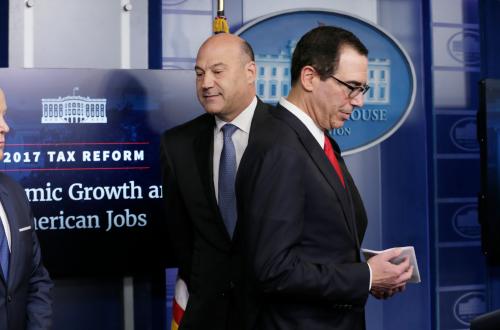This article originally appeared in Real Clear Markets on August 23, 2017.
On taking office, the Trump administration promised to repeal and replace Obamacare. So far, it has failed. It also promised to reduce and reform business and personal taxes. That effort, too, is heading for failure. Why? The reason is that both efforts are based on mutually irreconcilable principles and conflicting goals that cannot simultaneously be achieved. Together, these two failings make political consensus virtually impossible.
The health policy conundrum is now clear for all to see. Candidate Trump pledged to replace Obamacare with a plan that would insure as many people as Obamacare does, cut out-of-pocket costs for insurance and health care, and reduce federal spending. Congressional Republicans dutifully churned out successive draft plans, vainly trying to deliver on those incompatible promises. The Congressional Budget Office confirmed that each plan would indeed cut federal spending. As honest analysts, they also pointed out that those same plans would take health insurance from millions of people, thin out coverage for millions more, and raise the price of insurance of a given quality.
When the repeal-and-replace effort stalled, Trump first reacted with a certain wide-eyed innocence (“Who knew health care was so complicated?”). Then, when the legislative effort died in the U.S. Senate, he testily scolded Senate Majority leader, Mitch McConnell (“Can you believe that Mitch McConnell, who has screamed Repeal & Replace for 7 years, couldn’t get it done”). Actually, McConnell deserved kudos. By persuading all but three Senate Republicans to vote for a bill that polls showed the public detested and that would have injured tens of millions of Americans, the Senate leader nearly pulled off a political miracle.
The Republican tax reform agenda is built on equally contradictory goals.
The Republican tax reform agenda is built on equally contradictory goals. Republicans are committed to cutting tax rates because, they believe, taxes are too high and stifle economic growth. But they also think that federal budget deficits and rising debt hamper economic growth. So, the key question is whether one can one cut rates without boosting deficits and debt.
The answer is that it is possible—in principle, but not in fact, because doing so requires actions Republicans reject. Revenues can be maintained even with reduced rates if more income is taxed or if income rises. The problem is that increasing the share of income that is taxed entails doing some quite unpopular things, such as taxing employer contributions for health insurance and pensions and the currently excluded portion of Social Security benefits, or curbing such popular deductions as those for mortgage interest, property taxes, charitable contributions, and state and local income taxes. Few members of Congress, Republicans or Democrats, are prepared to vote for such measures.
Lower rates would not lower revenue if they spurred sufficient economic growth. To be sure, tax cuts will briefly boost consumer demand. But unless they also raise economic capacity, the gain will be temporary; and unless they raise capacity a lot, revenues will still fall. Gains in capacity are not in the cards, say responsible analysts. More capacity requires more investment. And although tax cuts will raise after-tax rates of return, they will lower investment anyway by diverting saving from productive investments at home or abroad to finance government deficits. Less investment means less growth, not more.
A new tax could counter the revenue loss from cuts in personal and business income tax rates. Some tax experts have urged a shift in the corporation income tax from one that applies to worldwide income of U.S. corporations to one that would apply equally to all sales in the United States of domestically produced goods and imports, but not to U.S. exports. This so-called ‘destination-based cash-flow tax’ (or DBCFT) would boost revenue because the United States currently imports about $500 billion a year more than it exports. Import-intensive businesses, such as Walmart or Target, would pay more in tax. Export industries, such as Boeing and Intel would pay less. Because this initiative splits businesses, most of whom support and contribute to Republican candidates, Republican leaders recently pronounced the DBCFT dead.
The most attractive source of new revenue is a tax on carbon, which would slow the emission of greenhouse gasses that contribute to global warming. Environmental economists of both parties support such a tax. But Congressional Republicans fear that such a tax might be used to raise overall revenues, something that most have pledged in writing not to permit.
So, the idea of “tax reform,” which almost everyone thinks is dandy in principle seems headed for the same legislative bone-yard as ‘repeal and replace.’ And for the same reason. Ideological slogans can win elections. But real legislation on complex subjects like health insurance policy and tax laws must come to grips with current laws and real economic interests.







Commentary
Op-edTax reform in 2017 is doomed to fail. Here’s why
August 23, 2017